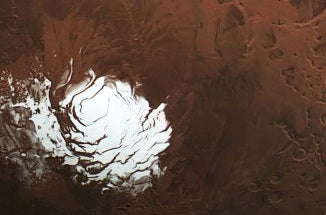
French Researcher’s Study Finds Groundwater Unlikely at Mars’ South Pole
- Feb 14, 2022
A study led by Cyril Grima, a French research scientist at The University of Texas at Austin, found that what had appeared to be liquid water under Mars’ frozen south pole is likely just volcanic rock buried beneath ice.
Scientists initially thought they’d discovered liquid water in 2018 after noticing a bright reflection on satellite radar data under the southern polar cap that had the appearance of a buried lake. Those findings, however, came into question when scientists noted it was unlikely that water could remain in its liquid state at Mars’ frigid south pole.
“For water to be sustained this close to the surface, you need both a very salty environment and a strong, locally generated heat source, but that doesn’t match what we know of this region,” said Grima, a planetary scientist at the UT Institute for Geophysics.
After placing an imaginary sheet of ice across a radar map of Mars to see how the data would stack up, UT scientists observed that volcanic plains all over the planet appeared as bright spots, just like those spotted at the south pole.
The beauty of Grima’s work is that it provides scientists with precise locations to search for evidence of ancient lakes and test hypotheses about the drying out of the red planet on a wider scale, said Isaac Smith, a Mars geophysicist at York University.
Grima and Smith now shift their focus to proposed missions of finding water on Mars with radar. This would allow the researchers to identify potential signs of past life as well as search for potential resources necessary to establish future landing spots for humans on the red planet.



